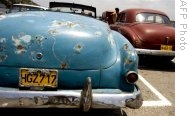 |
| Vintage cars in Cuba |
Cubans marked the 50th anniversary of the revolution that brought Fidel Castro to power this month, and its people used the occasion to celebrate and discuss life on the island nation. It's a sign of the difficulty many people face in Cuba: both day and night, people line lonely stretches of roadway with their thumbs outstretched trying to find a ride to and from work. Some visibly wave Cuban currency in their hands to encourage vehicles to stop and pick them up. In the countryside, this is how many Cubans get to their jobs. Each day. Each way.
"It's better that you take the money in the hands and you do autostop," said one person.
Buses, a few old remaining trains, and expensive taxis can only transport a minority of people here in Cuba. The majority of Cuban residents can not afford to own or rent cars. Vehicles manufactured in the 1950's amazingly still transport passengers. The government requires that any vehicles driving past someone in need of a ride must stop and pick them up. Police stand along the side of the road to make sure that happens.
Often travelers wait for a half-hour or more until they find a vehicle willing to take them. One traveler named Odalys told VOA that in her experience, it is difficult to get a ride if you travel with children. She says families wanting to travel together often are separated.
On this day, Odalys was traveling with her 18-year old niece when she explained the government's way of dealing with fuel and transportation shortages. The two were trekking two-thirds of the way across the country, from the more rural Camaguey to Havana. The drive alone would take in excess of 6 hours. Remarkably, Odalys says she has never failed to get a ride, even for long distances such as this.
Most often she'll have to offer to pay something in order to give drivers some incentive to stop, although usually she pays very little.
"Sometimes the driver says I don't want money, and you go free," she said.
Another woman told me she commutes two hours per day this way. She works in a pharmacy at a beachside resort, in Cuba's prosperous tourist industry. For her, the commute is worth the hassle because she can not afford to move from her family home.
Some Cubans ride in very old Russian-style open trucks. Others ride bikes, motorbikes and even horse-drawn buggies. Many push wheel barrows with their wares. They ring loud bells to announce the arrival of bottled fresh water.
It's one of the ways in which the Cuban people live their lives in a world without modern transportation and adequate access to fuel.
Life for Cubans can seem burdensome in other ways. Odalys says she earns very little. Her job involves sorting used clothing imported from Canada. Odalys says she is told to remove all items which bear an American Flag. Those clothes are set aside to be burned. The other shirts and pants are prepared to be sold at reduced prices in second-hand stores.
Odalys is a single mother of four children. She says it is difficult to adequately feed her family because she earns little and government rations are insufficient. "Because my little children have 9 years old. The parliament no give milk. After 7 years, it is finished," she said.
Cubans say the food rations are limited to a small monthly credit for some eggs, milk, oil, meat, rice and beans. They say acquiring food can be challenging because one never knows what the store will have in stock. Food ration cards expire after a month. If a Cuban has cash, they can buy what they need.
Shortages have inspired Cubans to be industrious. They aggressively target tourists expecting a tip and visibly showing disappointment when either given a smaller amount than they wanted. These folks provide services such as taking tourists to famous landmarks, restaurants and places to stay. Cubans get commissions from local merchants for bringing them business. These Cubans can earn in an hour what most earn in a month. They have learned to hustle. One man even washes cars using water from a bottle and an old shirt. He doesn't wait for permission to work, but rather sees a need and fills it, in the hopes for a substantial tip from an out-of-towner.
Additional cash has created another world for Cubans - the black market.
Hidden behind the closed doors of what look like private homes, are unofficial bars and restaurants, hair and nail salons, and shops. It's a world hidden inside Cuba's official world. And many say one can not live without it.
Cubans say their system isn't perfect, but some believe, while seemingly broken and backwards, it somehow still works.